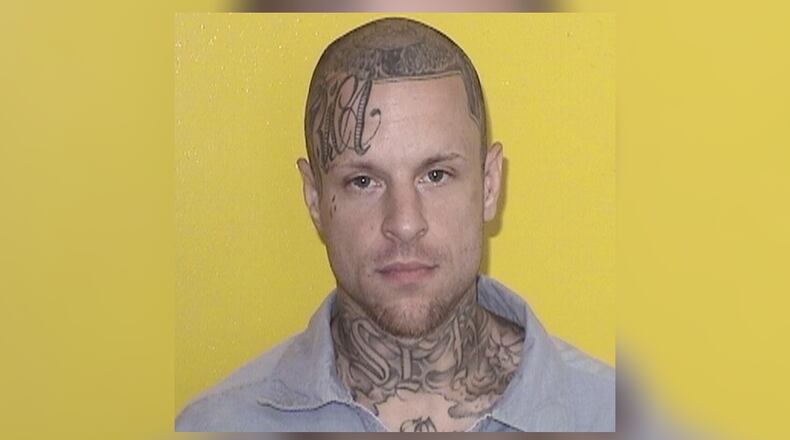Welninski, 34, is already serving a sentence scheduled to expire on Nov. 22, 2112, for attempted murder of a police officer, as well as felonious assault, carrying a concealed weapon and possession of a firearm in a liquor establishment in Wood County.
RELATED: Warren County Prosecutor: Execute prison murderers before they kill again
Drain, 38, is serving 30 years to life for aggravated murder, felonious assault and theft in Hancock County. Drain beat and stabbed to death a man who called police to report Drain had stabbed his father, according to a bill of particulars filed in the case.
Both are now in the Ohio State Penitentiary, the state’s supermax prison in Youngstown, after allegedly murdering other inmates while in the two prisons in Warren County.
Investigators allege that on April 13, Drain murdered prisoner Christopher M. Richardson at Warren Correctional Institution.
The attack left a cell in the prison “a blood-bath,” according to Warren County Prosecutor David Fornshell. Drain allegedly beat Richardson with the motor from a desk fan, stomped on his throat and kicked a pencil into his head.
Richardson was serving a four-year sentence for aggravated arson. He set fire to his mother’s home in January 2017, Delaware County court records show.
Welninski is accused of murdering cellmate Kevin Nill, 40, a Piqua man serving a short prison sentence for attempted domestic violence. That attack happened on April 23 at Lebanon Correctional Institution.
Nill and Welninski had been cellmates less than an hour before Nill was found with a bandage around his neck that Welninski was supposed to use to mobilize his broken arm. Nill was later pronounced dead at Atrium Medical Center, according to authorities.
With two prisons in their jurisdiction, inmate crime, much of it violent, is a frequent part of criminal dockets in Lebanon Municipal and Warren County Common Pleas courts.
Gov. Mike DeWine and Ohio House Speaker Larry Householder have both expressed concerns recently about the death penalty in Ohio.
Drug makers have threatened to cut off access to medications if Ohio uses them to carry out executions. That prompted DeWine to delay seven executions in 2019 and ask the Department of Rehabilitation and Correction for a new execution protocol.
“We may have a law in place that allows for a death penalty that we can’t carry out. And the question is: Are the costs that are associated with that and retrials and all these things, at the end of the day, is it worth that?” Householder told the Columbus Dispatch in December.
RELATED: Ohio political leaders debating future of state’s death penalty
On Thursday, Drain appeared via video conference from the Youngstown prison with one of his lawyers, while the other one sat in the courtroom in Lebanon with Judge Oda.
Drain, the judge and lawyers, including two prosecutors, discussed some of the numerous motions that are typically filed in death penalty cases in anticipation of trials stretching up to two weeks.
Defense lawyer John Kaspar said no motion to suppress evidence or statements would be filed “at this point in time” and that he and co-counsel Richard Wendell were “by and large” finished with filing procedural and constitutional motions.
Oda explained to Drain that he would be allowed to view, but not retain, photographic and other “counsel-only” evidence in the case.
Inmates in death penalty cases typically exercise their right to attend at hearings, requiring special precautions for transportation and security.
Wendell indicated Drain would likely again waive his right to appear at the next hearing, so far unscheduled, in the case set for a two-week trial beginning on Sept. 8.
“It does seem like it’s working out,” said Oda, also the judge in the Welninski case.
RELATED: Inmate faces death penalty if convicted of prison murder he confessed to in letter to newspaper
Welninski appeared earlier Thursday in Oda’s court, with prison and sheriff’s office security at the ready.
The lawyers discussed progress with questionnaires that are distributed to all potential jurors in the case.
On Feb. 12, the lawyers are expected to argue whether Oda should exclude evidence of “other acts” during the trial. They also discussed to what extent restraint of Drain should be hidden from the jury. Options include a stun belt, leg weights and a brace.
“I want to make sure there are no ambiguities,” Oda said. “I intend to make a very specific order.”
Oda said the level of law enforcement presence should not be overwhelming.
“We also need to be safe and secure,” he added.
Kaspar, who is representing both Drain and Welninski, said he and co-counsel Ryan DeBra need to review the alleged victim’s records.
Kaspar did not respond to an interview request following the hearing. Fornshell also declined to respond to questions for this story.
Both sides indicated their experts would be available for the trial, scheduled for two weeks beginning on March 2.
“No sir, thank you,” Welninski said when asked if he had anything to discuss in court.
RELATED: New lawyer appointed in Lebanon inmate death penalty case
About the Author

